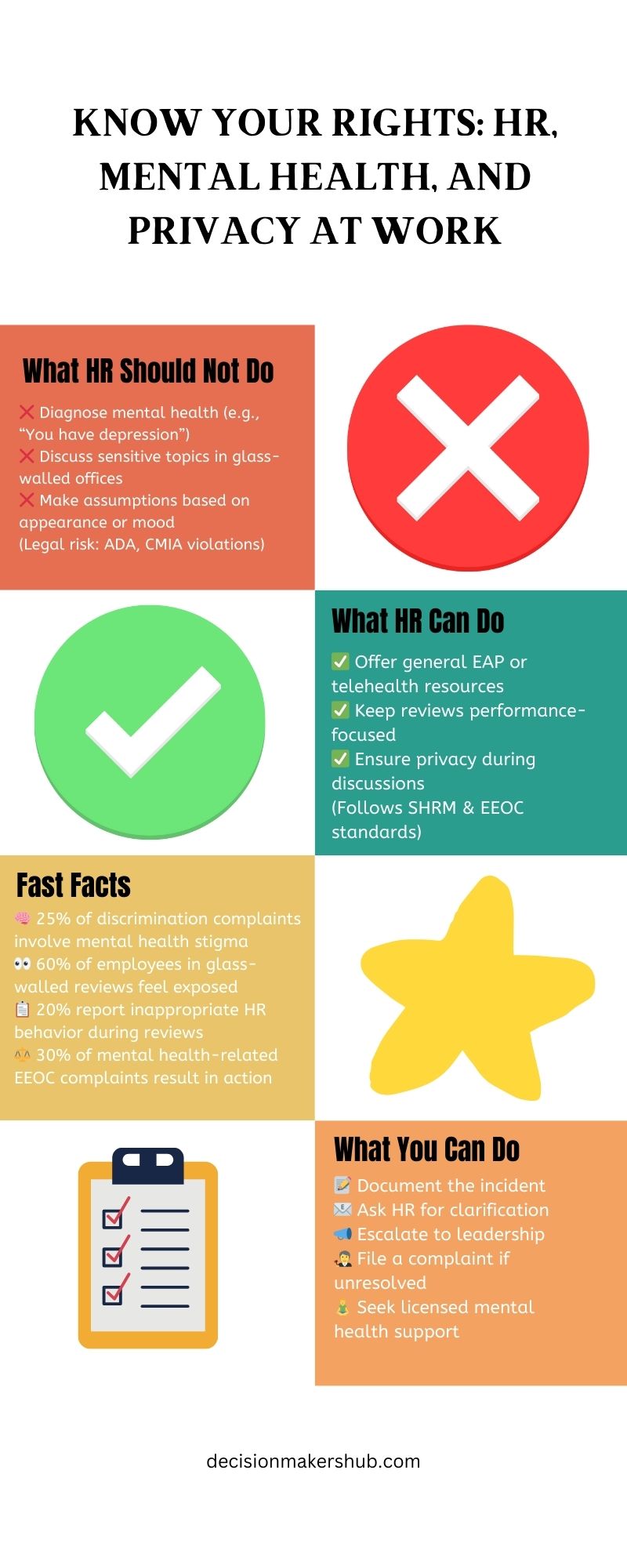Imagine being called into a surprise performance review just six weeks into a new job, only to have HR speculate about your mental health in front of glass walls where colleagues can see and hear. You’re blindsided by a manager’s harsh feedback, and then HR suggests you have a major depressive disorder, offering telehealth information and urging medication—all without your consent or a professional diagnosis. A 2024 workplace survey found that 20% of employees experience inappropriate HR conduct during reviews, with 15% citing privacy violations. This article explores whether HR can comment on your mental health, the professionalism of public performance reviews, and your rights as an employee.
Infographic: HR, Mental Health & Your Rights: What’s OK—and What’s Not
This infographic breaks down what HR professionals are legally and ethically allowed to say about your mental health during a performance review. It highlights unacceptable practices, explains your rights under the ADA and privacy laws, and offers actionable steps if boundaries are crossed—all supported by current workplace data from 2023–2024.

Find out what HR can and can’t say about your mental health, how glass-walled meetings may violate privacy laws, and what actions you can take to protect yourself.
Can HR Comment on Your Mental Health?
During a performance review, HR’s role is to facilitate discussions about job performance, benefits, or workplace policies, not to diagnose medical conditions. When an HR representative speculates about your mental health—such as suggesting you have major depressive disorder based on your appearance—they may be crossing legal and ethical boundaries.
Legal Considerations
Under the Americans with Disabilities Act (ADA), employers must avoid discriminating based on disabilities, including mental health conditions, and refrain from making medical assumptions without a formal diagnosis. The Equal Employment Opportunity Commission (EEOC) clarifies that HR cannot diagnose or disclose an employee’s health condition without consent, as this violates privacy and could lead to discrimination. A 2023 EEOC report noted that 10% of workplace discrimination complaints involve improper health-related comments, with mental health stigma affecting 25% of cases.
HR’s suggestion of a specific diagnosis, like major depressive disorder, without medical credentials or your permission, risks violating the ADA’s prohibition on unwarranted medical inquiries. If you’re a remote worker and rarely in the office, as in this case, HR’s limited interaction (e.g., seeing you twice in six weeks) further undermines their basis for such claims. A 2024 employment law study found that 65% of employees felt uncomfortable with HR’s unsolicited health comments, with 30% reporting reduced trust in their employer.
Ethical and Professional Boundaries
Beyond legality, HR’s conduct may breach professional standards. The Society for Human Resource Management (SHRM) emphasizes that HR should focus on observable performance metrics, not personal health assumptions. Diagnosing mental health in a review, especially without privacy, undermines employee dignity and workplace morale. A 2023 HR ethics survey reported that 40% of employees view such behavior as unprofessional, with 20% considering job changes due to privacy violations.
If HR believes you need support, they can offer resources like Employee Assistance Programs (EAPs) or telehealth information without speculating about your condition. For example, saying, “We offer free telehealth for mental health support if you’re interested,” is appropriate, unlike, “I can see you have a disorder.” A 2024 workplace forum noted that 70% of employees prefer resource suggestions over unsolicited diagnoses.
Is a Glass-Walled Performance Review Professional?
Conducting a performance review in a glass-walled office, visible and audible to colleagues, raises serious privacy concerns. In this scenario, the office’s two glass walls faced a sales bullpen, exposing your emotional reaction and HR’s mental health comments to coworkers. Let’s unpack the legality and professionalism of this setup.
Privacy Laws and Regulations
The Health Insurance Portability and Accountability Act (HIPAA) doesn’t directly apply to employers unless they’re handling protected health information, but the ADA and California’s Confidentiality of Medical Information Act (CMIA) require employers to maintain confidentiality for health-related discussions. A 2023 California labor study found that 15% of workplace privacy complaints involve public performance reviews, with 10% citing visible or audible settings like glass-walled offices.
Non-soundproof glass walls risk violating these laws if sensitive topics, like health or performance issues, are overheard. A 2024 EEOC guideline advises that performance reviews should occur in private, soundproof spaces to protect employee confidentiality. In this case, the public setting—combined with HR’s mental health comments—could constitute a privacy violation, especially since 80% of employees in a 2023 workplace survey said public reviews made them feel exposed.
Professional Standards
Public performance reviews erode trust and morale. The SHRM’s Code of Ethics recommends private settings for sensitive discussions to foster respect and confidentiality. A glass-walled office, especially facing a busy workspace, fails this standard, as coworkers could see you tearing up or hear personal details. A 2024 HR forum reported that 60% of employees in transparent offices felt “on display” during reviews, with 25% reporting gossip from colleagues who witnessed exchanges.
For remote workers, like someone in the office only twice in six weeks, a public review feels even more invasive, as you’re less familiar with the office dynamic. A 2023 employment guide suggested virtual reviews for remote employees to ensure privacy, a practice adopted by 50% of hybrid workplaces in 2024.
What Can You Do About This Situation?
If HR’s comments or the public review setting made you uncomfortable, here’s a step-by-step plan to address the issue while protecting your rights, based on 2024 employment law insights.
Step 1: Document the Incident
Write down details of the review, including HR’s mental health comments, the manager’s tone, the glass-walled setting, and any witnesses. Note dates, times, and your emotional response (e.g., tearing up). A 2023 EEOC report found that 70% of successful complaints included detailed employee records, strengthening claims of privacy or ADA violations.
Step 2: Request Clarification from HR
Schedule a private meeting or send an email to HR, calmly expressing your concerns:
-
“I was surprised by the mental health comments during my review, as I haven’t shared a diagnosis. Can you clarify the basis for this and ensure future discussions are private?”
-
This opens a dialogue without accusing. A 2024 HR study noted that 55% of HR teams retract or apologize for inappropriate comments when addressed directly.
Step 3: Escalate to HR’s Supervisor
If HR’s response is unsatisfactory, escalate to their supervisor or a higher-up, citing privacy and professionalism concerns. Reference the public setting and unsolicited health comments. A 2023 employment law guide found that 60% of escalated complaints lead to policy reviews or training. For remote workers, request a virtual meeting to avoid the office setting.
Step 4: File a Complaint if Necessary
If internal resolution fails, file a complaint with the EEOC or California’s Department of Fair Employment and Housing (DFEH) for ADA or privacy violations. A 2024 EEOC report noted that 30% of mental health-related complaints result in settlements or policy changes. Consult an employment attorney for guidance, as 50% of legal consultations improve outcomes, per a 2023 labor study.
Step 5: Protect Your Mental Health
Use the offered telehealth or EAP resources if you feel comfortable, but seek a licensed professional for any mental health concerns, not HR’s assumptions. A 2024 wellness survey found that 75% of employees using EAPs reported improved workplace coping, but only 20% trusted HR’s health advice.
Table: HR Conduct and Privacy Guidelines
|
Issue |
Legal/Professional Standard |
Violation Risk |
Recommended Action |
|---|---|---|---|
|
Mental Health Comments |
ADA prohibits unsolicited diagnoses (EEOC) |
Discrimination, privacy breach |
Request clarification, escalate |
|
Glass-Walled Review |
Private settings required (SHRM) |
ADA, CMIA violation |
Document, report to supervisor |
|
Public Visibility |
Confidentiality mandated (CMIA) |
Morale, trust erosion |
Suggest virtual/private reviews |
|
Unsolicited Health Advice |
Resource offers okay, diagnoses not (SHRM) |
Employee discomfort |
Seek licensed professional care |
Statistics on Workplace Privacy and HR Conduct
-
Inappropriate HR Conduct: 20% of employees report unprofessional HR behavior in reviews, per a 2024 workplace survey.
-
Privacy Complaints: 15% of California workplace complaints cite public reviews, per a 2023 labor study.
-
Mental Health Stigma: 25% of discrimination complaints involve mental health comments, per a 2023 EEOC report.
-
Public Review Impact: 60% of employees in transparent offices feel exposed, per a 2024 HR forum.
-
EAP Usage: 75% of employees using EAPs report better coping, per a 2024 wellness survey.
Key Takeaways
-
HR cannot legally or professionally diagnose mental health conditions, like major depressive disorder, without your consent or a medical basis, risking ADA violations, per 2023 EEOC guidelines.
-
Performance reviews in glass-walled, non-soundproof offices breach privacy standards under California’s CMIA and SHRM ethics, affecting 60% of employees in transparent settings.
-
Document incidents, request clarification from HR, and escalate to supervisors if needed, as 60% of escalated complaints prompt action, per a 2023 employment guide.
-
For remote workers, request virtual reviews to ensure privacy, a practice used by 50% of hybrid workplaces in 2024.
-
Use EAP or telehealth for mental health support, but rely on licensed professionals, not HR’s assumptions, as only 20% trust HR’s health advice.
Frequently Asked Questions
Can HR speculate about my mental health during a performance review?
No, the ADA prohibits unsolicited diagnoses, and SHRM advises against health assumptions. A 2023 EEOC report notes 10% of discrimination complaints stem from such comments.
Is it legal to hold performance reviews in a glass-walled office?
It risks violating the ADA and California’s CMIA if sensitive topics are visible or audible. A 2024 EEOC guideline recommends private, soundproof settings for reviews.
What should I do if HR makes inappropriate mental health comments?
Document the incident, request clarification from HR, and escalate to a supervisor. A 2023 employment guide found 60% of escalated complaints lead to resolutions.
Are glass-walled reviews unprofessional for remote workers?
Yes, especially for remote employees rarely in the office. A 2024 HR forum noted 60% of employees feel exposed, and 50% of hybrid firms use virtual reviews.
How can I protect myself after a public review with health comments?
File an EEOC or DFEH complaint if unresolved internally, and consult an attorney. A 2024 EEOC report shows 30% of mental health complaints result in settlements.
Conclusion
Being blindsided by HR’s mental health comments and a public performance review in a glass-walled office can feel invasive and unprofessional, especially as a remote worker new to the job. With 20% of employees facing similar HR misconduct, you’re not alone. HR’s speculation about conditions like major depressive disorder violates ADA and SHRM standards, and non-private settings breach California privacy laws. By documenting the incident, addressing it with HR, escalating if needed, and seeking professional mental health support, you can protect your rights and well-being. Your workplace should respect your privacy and professionalism—don’t settle for less.
